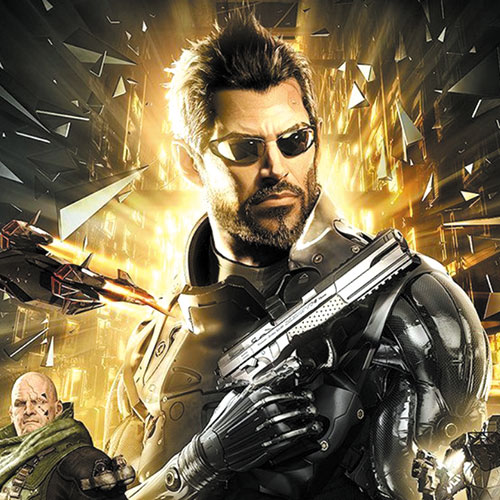Sci-fi adventure has big heart with a mechanical soul

By Andrew Reiner | Game Informer Magazine
The game “Deus Ex: Mankind Divided” is futuristic science fiction, but the message it delivers stems from today’s societal problems. Police shoot unarmed innocents, extremist groups unleash acts of terror, and communities are torn apart by segregation. The story explores these issues thoroughly and makes a clear statement about the threat posed by totalitarianism, but the delivery is often heavy-handed and overstated. In establishing its vision of an oppressed world, the player is treated like a hard drive for extensive downloads of backstory and lore — so much so that I had to make notes just to keep track of all of the shadow organizations, acronyms, and shady government officials. The game made me think about my world, which is clearly the intent, but I never felt a strong connection to the game or the role protagonist Adam Jensen plays within it. Eidos Montreal attempts to disguise hot-button issues as speculative fiction, but sacrifices an interesting story to hammer home its messaging.
Even Jensen is off his game, often appearing so gloomy he makes RoboCop seem like the life of the party. When we first meet Jensen, he’s on assignment in Dubai, tracking an arms dealer through an unfinished skyscraper. This mission displays the promise of “Deus Ex’s” gameplay, deftly mixing stealth with hacking and the occasional exchange of gunfire. This mission is paced nicely and delivers true excitement, culminating in the surprise assault by a new terrorist cell. It’s a hell of an introductory sequence, but the game never finds that pulse again and instead becomes formulaic.
Once the action starts in earnest, the missions are surprisingly dull, mostly having the player navigate a sea of enemies to track down people to communicate with or an object of desire. I know this may sound like “Deus Ex” at its core, but my back was hardly ever against a wall, and I wasn’t compelled to search high and low for a more efficient path. I rarely ran into a need to switch play styles (as I did in Deus Ex: Human Revolution, the precursor game), as most zones are only lightly peppered with guards or threats.
Outside of the critical-path missions, the world opens up and allows players to sink their teeth into what “Deus Ex” is known for: player freedom. None of the hub worlds are huge, but they are all truly open, with numerous side missions to tackle and secrets hidden well off of the beaten path. The world itself is beautifully realized, visually giving us a look at the different wealth classes, and the impact government has had on their states of living. Just walking the streets can be an intense experience, given how heavily policed some areas are.
Eidos Montreal also does a great job of leaving navigation up to player discovery. Figuring out how to reach points of interest is left entirely up to you, and it’s glorious. Thorough exploration is often required, and rewarded with helpful shortcuts, loot galore, interesting people to meet, and additional side quests. Good fun can come from these diversions. I got a huge kick out of tracking down a magician that was using his powers to create a cult, and looting random people’s homes is also worthwile.
The one interesting wrinkle in Jensen’s life is the discovery of concealed mods in his body. He doesn’t know who put them there or what might happen when he uses them. This revelation smacks of a bad omen and future plotline, but ends up being little more than a gameplay gimmick, providing a new set of abilities for players to explore. As fun as these powers can be — ranging from tesla blasts to bursts of super speed — nothing is as enjoyable or reliable as the basic stealth techniques, like hiding behind boxes and sneaking up behind opponents.
The A.I. foes behave realistically when they don’t know you are around; they look through windows, turn in different directions while walking, and require careful studying just as they patrol hallways. Should they discover your location, there’s little need to panic, as they are often as dumb as bricks. They can be exploited easily — so much so that firefights often end with piles of bodies blocking a doorway.
Although the role playing game systems offer a variety of upgrades, I only really needed to focus on a few stealth-based paths to take full advantage of the stealth play, and many of those systems return from the first game. A good number of the new upgrades improve Jensen’s proficiency from afar, meaning you don’t just have to rely on firearms. These additions help flesh Jensen out as a capable one-man army, but don’t necessarily change how you approach any encounter.
Although Eidos Montreal apologized for the terrible boss battles in “Deus Ex: Human Revolution,” this sequel delivers a battle that is just as infuriating. I ended up cheesing the sequence by hiding in a vent, and picking away at his health.
I like seeing games tackle difficult subject matter, but that message, while occasionally coming through loud and clear, is ultimately lost in this dull and slow-moving story. “Mankind Divided” starts off with a bang, but quickly becomes a muddled mess of politics and techno-babble.
“Deus Ex: Mankind Divided”
Platform: PlayStation 4, Xbox One, PC
Style: 1-Player Action
Publisher: Square Enix
Developer: Eidos Montreal
Rating: M, for Mature











